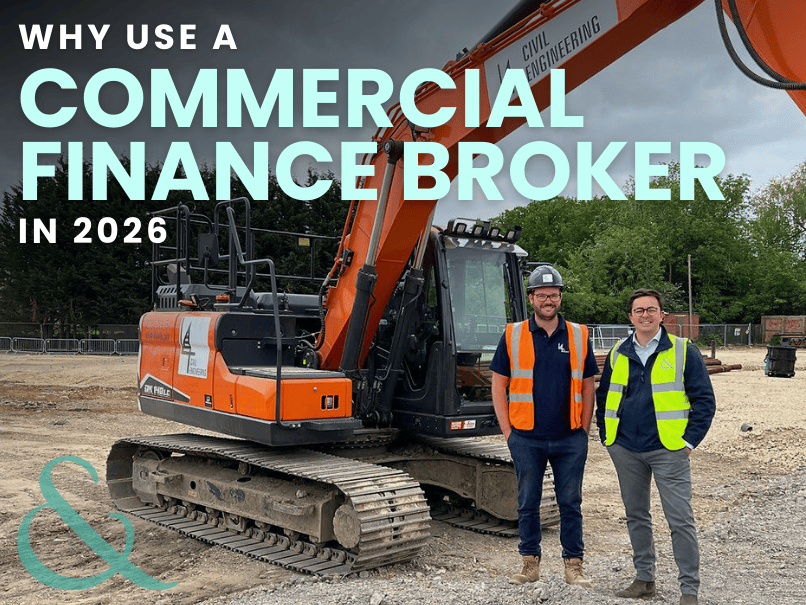Table of contents
Whether you're looking to purchase your first commercial property or growing an established portfolio, understanding your finance options is key. Unlike residential mortgages, commercial property finance can be complex - but with the right insight, you can navigate the landscape with confidence and secure funding aligned with your strategic goals.
In this guide, we’ll walk you through everything you need to know, from straightforward buy-to-let arrangements to sophisticated development finance, so you're equipped to make informed, profitable choices.
Why Finance Commercial Property?
Purchasing commercial property with finance rather than paying outright can offer several strategic advantages:
- Preserve cash flow for day-to-day operations and unexpected opportunities
- Leverage borrowed funds to amplify investment returns
- Spread risk across multiple properties rather than tying up capital in one asset
- Benefit from tax efficiencies associated with borrowing*
- Access higher-value properties that might otherwise be out of reach.
* You should always seek independent professional Tax advice.
Types of Commercial Property Finance
🏢 Buy-to-Let Mortgages
Buy-to-let mortgages are generally the most straightforward form of commercial property finance for smaller investment properties.
How they work: Similar to residential mortgages but assessed based on rental income potential rather than personal income.
Ideal for: Individual investors or small businesses purchasing rental properties
Key features:
- Substantial deposit required (varies by lender and property)
- Interest rates typically higher than residential mortgages
- Flexible repayment terms available
- Rental income must cover mortgage payments with adequate buffer
Pros:
✅ Predictable monthly payments
✅ Straightforward application process
✅ As the property value increases, your equity grows
Cons:
❎ Personal guarantees are required
❎ Approval tied to rental income viability
🏢 Commercial Mortgages
Commercial mortgages are designed for businesses purchasing property for their own use or investors purchasing larger assets.
How they work: Secured against the property with repayments based on business income and property value.
Ideal for: Established businesses buying premises, offices, or investment properties.
Key features:
- Competitive loan-to-value ratios for established businesses
- Flexible repayment structures: interest-only, capital & interest
- Tailored interest rates based on risk profile
Pros:
✅ Competitive commercial mortgage rates for creditworthy businesses✅ Builds commercial credit profile
✅ Broad lender appetite for different sectors
Cons:
❎ Director guarantees often required
❎ Additional costs (valuations, legal, arrangement fees)
🏢 Development Finance
Development finance is specialist short-term funding for property development or major refurbishments.
How they work: Drawn in stages based on project milestones, typically over 12–24 months.
Ideal for: Experienced developers and investors with refurbishment or ground-up projects.
Key features:
- Higher interest rates due to short-term nature and project risk
- Requires detailed plans, costings, and exit strategy
- Funds released as development progresses
Pros:
✅ Unlock significant capital for large-scale projects✅ Flexible drawdown aligned with project timelines
✅ Potentially higher returns upon completion
Cons:
❎ Risk of delays and budget overruns
❎ Complex application and monitoring process
🏢 Bridging Loans
Bridging loans provide fast, short-term finance to cover time-sensitive property purchases.
How they work: Secured loans for up to 24 months, typically used to bridge the gap before securing long-term finance.
Ideal for: Auctions, chain breaks, or refinancing under pressure.
First Charge Bridging Loans:
- Primary security against the property
- More competitive rates and terms
- Faster decisions and completion
Second Charge Bridging Loans:
- Additional security behind existing mortgage
- Higher rates due to increased risk position
- Used when first charge not available
Pros:
✅ Very quick turnaround (as little as a few days)✅ No monthly repayments (interest can be rolled up)
✅ Ideal for short-term liquidity
Cons:
❎ Expensive if held long-term
❎ Clear exit plan is essential
❎ High setup and legal fees
Types of Commercial Properties You Can Finance
Commercial property finance covers a broad range of property types:
- Offices: Traditional, serviced, and co-working spaces
- Retail: Shops, cafés, and restaurants
- Industrial: Warehouses, factories, logistics units
- Mixed-Use: Residential-commercial combinations
- Healthcare & Specialist: Care homes, HMOs, hotels, petrol stations
The Commercial Property Finance Process
1. Initial PlanningDefine your investment goals, assess financials, and determine budget.
2. Property Search & Evaluation
Identify suitable properties, conduct due diligence, and obtain valuations.
3. Finance Application
Compile required documents, business plans, and financial projections.
4. Underwriting Process
Lenders assess the business, property, and applicant’s creditworthiness.
5. Offer & Completion
Negotiate terms, appoint solicitors, and finalise the transaction.
Typical Timelines:
- Buy-to-Let & Commercial Mortgages: Several weeks
- Development Finance: 4–6 weeks
- Bridging Loans: A few days to a couple of weeks
Understanding Commercial Property Finance Rates
Rates Are Influenced By:
- Loan-to-value (LTV) ratios
- Property type and condition
- Your business’s credit profile
- Lender risk appetite and economic context
General Rate Trends:
- Buy-to-Let: Competitive for low-risk properties
- Commercial Mortgages: Reflect borrower and asset risk
- Development Finance: Higher due to complexity and short terms
- Bridging Loans: Premium pricing for speed and flexibility
Remember: The cheapest rate isn't always the best deal. Consider arrangement fees, legal costs, and overall terms when comparing options.
Before You Apply: What to Prepare
Financial Readiness:
- Good credit history (business and personal)
- Adequate deposit available
- Strong trading record and financial documentation
- Clear investment or exit strategy
Professional Support:
- Commercial finance broker
- Solicitor experienced in property transactions
- Surveyor for accurate valuation
- Accountant for tax planning and structuring
Common Challenges and How to Address Them
💼 Limited Trading History
Challenge: Many lenders require 2-3 years of accounts
Solutions:
- Highlight relevant experience and qualifications
- Provide detailed business plans
- Consider specialist lenders
- Increase deposit size
💼 Complex Property Types
Challenge: Unusual properties can be difficult to finance
Solutions:
- Work with specialist commercial brokers
- Explore niche lenders
- Consider alternative structures
💼 Market Conditions
Challenge: Economic uncertainty affects lending appetite
Solutions:
- Build strong applications with conservative projections
- Maintain flexibility in timing
- Consider multiple lender options
Frequently Asked Questions
Q: How much deposit do I need?
A: Typically 20–40%, depending on property type, lender, and risk profile.
Q: Can I avoid a personal guarantee?
A: Rare, but possible for larger, well-established businesses.
Q: How much can I borrow?
A: Subject to property value, projected income, and financial strength.
Q: How fast is approval?
A: Bridging finance can complete in days. Mortgages and development finance take longer.
Q: Are rates fixed or variable?
A: Both options exist - fixed offers certainty, variable may offer flexibility.
Q: Can I refinance later?
A: Yes - refinancing can release equity, lower rates, or restructure your strategy (subject to status and approval).
Making Your Decision
Choosing the right commercial property finance depends on your specific circumstances*:
- For first-time investors: Start with buy-to-let mortgages on straightforward properties
- For established businesses: Commercial mortgages offer competitive rates and flexible terms
- For time-critical opportunities: Bridging loans provide speed and flexibility
- For development projects: Specialist development finance matches funding to project stages
* This information is provided for reference only and you should always seek independent professional advice tailored to your individual circumstances
Next Steps: Getting Started
If you’re ready to explore commercial property finance options:
- Clarify your objectives
- Organise your financials and projections
- Speak with a Commercial Finance Specialist who understands the market
- Compare offers with multiple lenders
At Charles & Dean, we help investors and businesses access tailored commercial finance solutions. Whether you’re purchasing a shop, an office, or a development site, we’ll guide you through the process from start to finish.
Book a consultation today and discover how we can help you secure the right funding for your next commercial property venture.
Driven by his entrepreneurial spirit, Simon Grace ensures Charles & Dean delivers the very best. His commitment to driving the pace of life at C&D is evident across all areas of the business, and his passion for nurturing ambition is clear. Beyond building a team founded on determination, Simon has been instrumental in fostering strong partnerships and brand associations, reinforcing C&D’s position in the industry. He continues to drive the company’s tremendous growth, ensuring it remains a resilient and tenacious force in finance.
Fill out the form to request a callback
No Obligation Enquiry
Tailored Broker Support
Enquire in Minutes
Wide Panel of Lenders







.png?width=806&height=605&name=Why%20Use%20a%20Car%20Finance%20Broker%20(4).png)




.jpg)
-1.jpg)